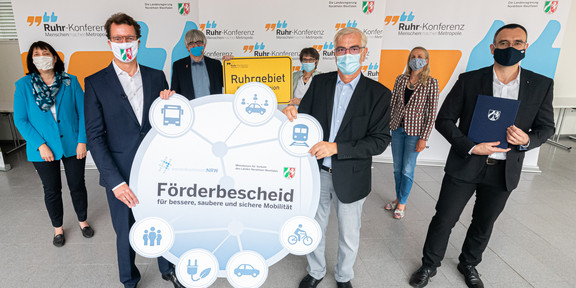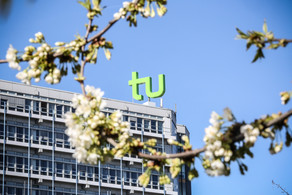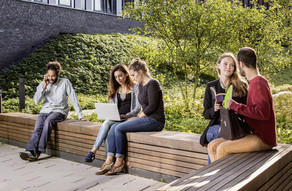"InnaMoRuhr" researches commuter traffic between Ruhr universities
- News
- Fakultät

LAND NORTH RHINE-WESTPHALIA SUPPORTS PROJECT WITH AROUND 1.9 MILLION EURO
The research project could advance the sustainable mobility of 120,000 students of the University Alliance Ruhr (UA Ruhr): On July 27, Transport Minister Hendrik Wüst handed over a funding notice over 1.9 million euros for the "InnaMoRuhr" project, which will be carried out by the TU Dortmund University, the Ruhr University Bochum and the University of Duisburg-Essen over the next three years. The aim is to facilitate commuting between the four locations of the UA Ruhr. After all, students have been able to attend courses at neighbouring universities since the establishment of the Bildungsraum Ruhr hoch drei in 2009.
"What has long been successful for the transfer of knowledge between universities, we are now doing better in terms of mobility. A networked offering that directly links the university locations of Dortmund, Bochum, Essen and Duisburg," said Minister Wüst. "Good connections and accessibility is a location factor - also for research institutions. This is why we are investing 1.9 million euros of state funding for research and development of intelligent mobility between universities. This brings us much closer to one of the goals of the Ruhr Conference: strengthening the knowledge location in the Ruhr metropolitan region.".
"If all goes well, the new approaches that promise the most success will be implemented permanently by the established transport providers, but also by new providers," hopes project coordinator Prof. Johannes Weyer from the TU Dortmund University. "This could change not only the mobility of students, but also of around 20,000 employees between the three universities."
From simulation to the real laboratory
The project consists of several components: In the first step, mobility needs will be assessed by means of surveys and gaps in public transport services will be identified. From this, the researchers want to develop scenarios for sustainable mobility in the future. The scenarios that promise the most success are to be modelled in the SimCo traffic simulator and their feasibility tested in simulation experiments. What could this mean in concrete terms? An electrically driven shuttle bus with, for example, twelve seats commutes between two locations. At the end of each route there is a charging station which supplies the shuttle bus with energy.
The project participants would test this and other new, locally emission-free technologies as well as innovative mobility services - such as ridesharing via app, i.e. a lift - in the real laboratory. Local transport providers such as DSW21, Bogestra and VRR want to involve the researchers. Members of the three UA Ruhr Universities would be given the opportunity to test the new commuter options at a low fare for a period of six months and test their feasibility in real life.
Funding until 2023
The project has a total volume of 2.4 million euros. The NRW Ministry of Transport will provide around 80 percent of this sum for the period from 2020 to 2023. The project is supported by six interdisciplinary working groups from sociology, economics and engineering. Alongside Prof. Johannes Weyer from the TU Dortmund University, the participants are Prof. Michael Roos and Prof. Constantinos Sourkounis from the Ruhr University Bochum as well as Prof. Heike Proff, Prof. Petra Stein, Prof. Frank Kleemann and Prof. Pedro José Marrón from the University of Duisburg-Essen.
Weitere Informationen zum Projekt
About the UA Ruhr
Since 2007, the Ruhr-Universität Bochum, the Technische Universität Dortmund and the University of Duisburg-Essen have been working closely together strategically under the umbrella of the UA Ruhr. The services of the partner universities are being systematically expanded by pooling forces. Under the motto "better together", there are now over 100 cooperations in research, teaching and administration. With more than 120,000 students and almost 1,300 professors, the Ruhr University of Applied Sciences is one of the largest and best performing science locations in Germany.
Weitere Informationen zur UA Ruhr
Contact person for further questions:




